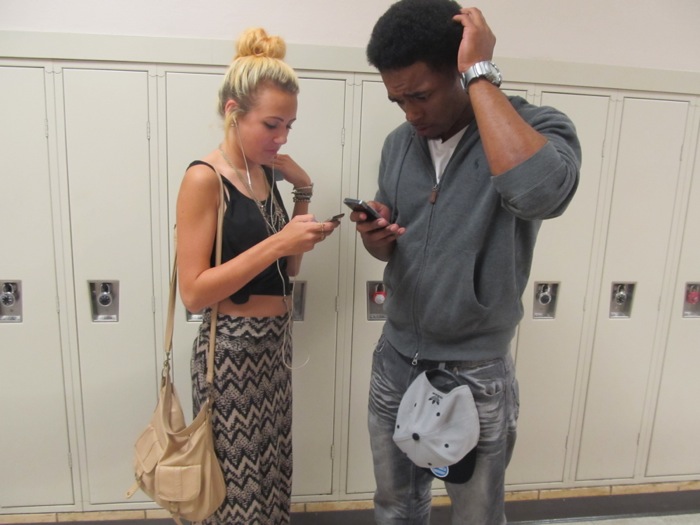What lurks underneath
Social Media has redefined the terms lurking and stalking, and the definitions are not always negative
Sophomore Taylor Bowen and senior James Pul- liam check their phones during passing time. It is easy to lurk online with cell phones.
October 22, 2013
According to Webster’s Dictionary, the definition of stalking is to follow, watch, and bother [someone] constantly in a way that is frightening or dangerous.
Over the years the term stalking has transformed into some- thing entirely different. Now, stalking has taken a less serious tone. Instead of calling it stalking, most prefer the term “lurking” when referring to social media activities.
“People lurk to find out information that they do not know. Lurking is just you looking at one particular thing or for a particular thing,” junior Lachai Allen said.
Most lurking occurs over the Internet on social networking sites. These websites reveal everything about a person. Individuals lurk when they care and would like to find out information that they cannot just walk up to another person and ask.
“This is not okay because you are in everybody’s business. You can find out things that get your feelings hurt,” sophomore Ariel Hayes said.
Most people post private information on social sites, not knowing that others have access to view it. There are also websites that allow people to read your every move, like Twitter, or see every picture you take, like those posted on Instagram.
“Lurking is when you look on their Facebook, Instagram, or Twitter. Stalking is when you take it to another level, when you try to watch their every move,” senior Stephon Patillo said.
Now that people are communicating in different ways, there is more of a chance that people can find out personal information.
“People put themselves out there. Everybody has a page, and if your page is public or partially pub- lic, you cannot be surprised when people from the public look at it,” English teacher Melissa Monzyk said.
The word stalking still has a negative meaning behind it. The thought of being followed, watched, or bothered to an extent that it is threatening. Nobody really confesses to partaking in stalking, but when the word lurking is used, people seem more ready to admit doing it.
It is a matter of quantity, how often people are partaking in lurking. Lurking can become dangerous if it is overused, or when
it is done for a bad reason. If an individual lurks on their significant other’s web pages to find out what they have been doing all day, they might come across information that they would rather not have seen.
“You should not have to lurk if you trust somebody, but there are snakes out here,” freshman Angelo Johnson said.
On the other hand, lurking can be used for helpful causes. Employers search their applicant’s names and lurk on the Internet before they hire their employees
to make sure they are qualified. Teachers can even look up their students on Facebook, so they can learn more about them and connect with them.
“It is the purpose too. If you are lurking out of curiosity, that is different then doing it out of obsession. It is like curiosity turned dangerous,” Monzyk said.



